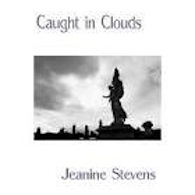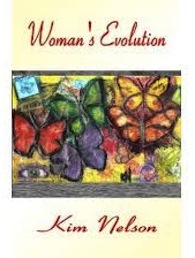Book Review
Caught in the Clouds by Jeanine Stevens, Finishing Line Press, 2011. $12
Woman’s Evolution by Kim Nelson, Finishing Line Press, 2011. $14
Reviewed by Zara Raab
In Jeanine Steven’s lovely poem, “Kosode,” the poet folding or perhaps mending the short-sleeved kimono marvels:
How easily the needle keeps
the silken threads separate.In the folds, I find the feather
I was looking for, and therein the seam, pieces of the crescent
moon from last night—fallen. [“Kosode,” 8]
In matters of dress, women and men, too, once made their own or hired a seamstress or tailor, milliner or haberdasher. Capitalism and technology changed all that. New ready-made clothes became affordable to all but the very poor. Now only First Ladies, princes, and media celebrities have clothing especially designed and stitched for them. But the powerful need of a human being for possessions uniquely their own, whether cloak or poem, seems to be fulfilled these days in part by collections of poems written in the quiet of one’s back garden or corner café and handsomely produced by one of the many small presses around the country, like Finishing Line Press.
The hallmark of both collections reviewed here is grace and simplicity of thought and poetic construction. Jeanine Stevens’ delicate, crafted poems light on memory—in several poems on childhood and its disappointments—and on the natural world of backyard animals and insects—whether house wren, gulls, or water striders. In her poem, “Mantis”
This delicate carnivore, gangly,
deep yellow-green, body
swaying, mimics a slight breeze,
small head cocked in deep thought. [“Mantis, 19”]
Speaking behind “Mantis,” whether Stevens is aware of it or not, is the mantis Louis Zukofsky imagines will save the world in his poem titled “Mantis”:
Mantis! praying mantis! since your wings’ leaves
And your terrified eyes, pins, bright, black and poor
Beg-”look, take it up” (thoughts’ torsion) ! “save it! ”
Jeanine Stevens returns often to spiritual and religious themes and occasions (a wedding, for example). Her interest is mainly aesthetic, her tone well mannered, never slipping into dogma, never preachy. Domestic objects and activities, sewing and bread-making, become metaphors for spiritual struggle. In “Mary’s Bread,” kneading the dough, her body “like an anvil,”
[Mary] glances at the painting
on the wall and wonders
about the carpenter
who crafted that cross—
how long it took,
a day a week, the sweat,
the chosen wood:
fine plane or rough? [“Mary’s Bread,” 15]
In keeping with the simple grace of her work, Stevens finds inspiration in the colorful surfaces of paintings by Van Gogh and Chao Shoo An. In a roadside café in Bakersfield, the poet buys a blue nun figurine, a religious icon perhaps, which provides the one moment of genuine surprise in this slim, charming collection.
I fasten her rusty hook to my saddle,
ride out and show her Nevada,
where blue is wide [. . . ]
[“The Blue Nun,” 24]
* * *
Woman’s Evolution is a first poetry collection by the nonfiction writer Kim Nelson. Her style here is improvisational, and hence strongly personal:
The path I followed to this place
Twisting, turning and rarely pristine
Does not match up with the life I dreamed
When I was seventeen. [3]
In this poem, titled simply “501a” a mother is asking a child if her dad wore this style blue jean. It begins simply enough, but builds ominously to a frightening conclusion of violence and fear. In poems with titles that read like chapter headings in a self-help manual for co-dependents, titles like “Addiction,” “Enabling,” and “Letting Go,” Nelson grapples with social and familial problems endemic to our culture:
Why is hope not injectable?
Why is love not enough? [“Addiction,” 12]
These are serious issues as any thoughtful, mature person who has raised children and work with troubled persons knows, but I couldn’t help feeling some of the poet’s questions would be better left unsaid. They seem to nag and gnaw at the issues. In “Enabling,” for example, the poet asks
Who, what, was right?
Who gave—or took—too much?
Who too little?
Yet I am moved by Nelson description of a mother cradling her adult child.
I cradle you in my arms.
All six feet of you.
It’s easier than you’d think.
You.
This moment.
Perfect.
It will be our last, this exchange,
Until we meet on a different plane.
Caught in the heroin snare,
You’ll leave this time, this place, this space.
And so I hold you here, now.
[“Letting Go,” 14]
Nelson’s simple verses move from parenthood to middle and old age, chronicling in the style of a journal the feelings and attitudes of the moment:
It’s my attitude,
Perception,
Hormones
Or my mind.
They change.
Fickle. [“Fabulous, Fickle & Flawed,” 20]
The form here is open and intuitive. Nelson is less skillful to my mind in the two or three poems in which she turns to rhyme and meter. This is perhaps because the bar is very high in English for these strategies, and a poet must have a very sharp pen and a very good ear to use them effectively.
For expressive, literate individuals in our society, poems can be tailor-made for grappling with the difficult emotions of a woman’s life, as Nelson does in Woman’s Evolution, or for capturing nuances of the natural and spiritual worlds in figured speech, as Jeanine Stevens does in Caught in the Clouds. Finishing Line Press is the tailor of choice for many poets, especially those, like Nelson, who are publishing their first book.
Zara Raab’s Book of Gretel was published by Finishing Line Press in 2010. Her most recent book is Swimming the Eel (Word Tech, 2011) came out in September. Her poems, reviews, and essays appear in West Branch, Arts & Letters, Nimrod, The Dark Horse, River Styx, Redwood Coast Review, Poet Lore, Colorado Review and elsewhere. She lives in Berkeley, California. Visit her website for more information.



